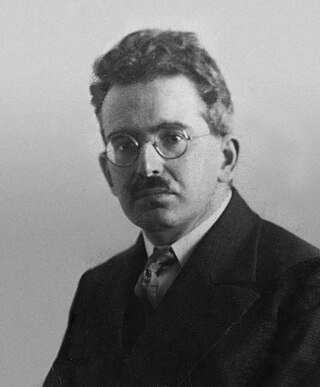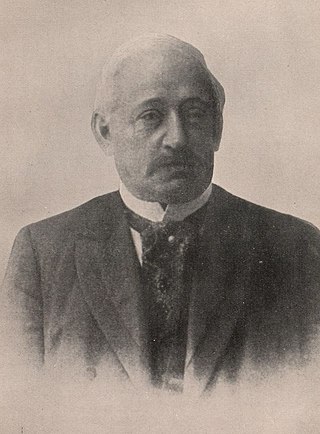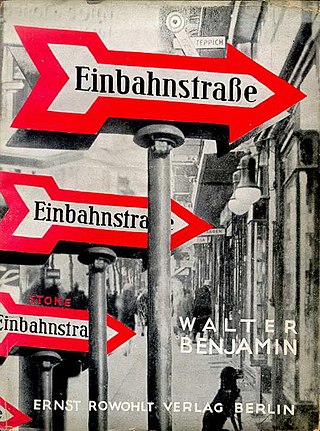
Max Horkheimer was a German philosopher and sociologist who was famous for his work in critical theory as a member of the Frankfurt School of social research. Horkheimer addressed authoritarianism, militarism, economic disruption, environmental crisis, and the poverty of mass culture using the philosophy of history as a framework. This became the foundation of critical theory. His most important works include Eclipse of Reason (1947), Between Philosophy and Social Science (1930–1938) and, in collaboration with Theodor Adorno, Dialectic of Enlightenment (1947). Through the Frankfurt School, Horkheimer planned, supported and made other significant works possible.

Theodor W. Adorno was a German philosopher, musicologist, and social theorist.

Expressionism is a modernist movement, initially in poetry and painting, originating in Northern Europe around the beginning of the 20th century. Its typical trait is to present the world solely from a subjective perspective, distorting it radically for emotional effect in order to evoke moods or ideas. Expressionist artists have sought to express the meaning of emotional experience rather than physical reality.

Walter Bendix Schönflies Benjamin was a German Jewish philosopher, cultural critic, media theorist, and essayist. An eclectic thinker who combined elements of German idealism, Romanticism, Western Marxism, Jewish mysticism, and Neo-Kantianism, Benjamin made enduring and influential contributions to aesthetic theory, literary criticism, and historical materialism. He was associated with the Frankfurt School, and also maintained formative friendships with thinkers such as playwright Bertolt Brecht and Kabbalah scholar Gershom Scholem. He was related to German political theorist and philosopher Hannah Arendt through her first marriage to Benjamin's cousin Günther Anders though the friendship between Arendt and Benjamin outlasted her marriage to Anders. Both Arendt and Anders were students of Martin Heidegger, whom Benjamin considered a nemesis.

The Frankfurt School is a school of thought in sociology and critical philosophy. It is associated with the Institute for Social Research founded at Goethe University Frankfurt in 1923. Formed during the Weimar Republic during the European interwar period, the first generation of the Frankfurt School was composed of intellectuals, academics, and political dissidents dissatisfied with the contemporary socio-economic systems of the 1930s; namely, capitalism, fascism, and communism.

Siegfried Kracauer was a German writer, journalist, sociologist, cultural critic, and film theorist. He has sometimes been associated with the Frankfurt School of critical theory. He is notable for arguing that realism is the most important function of cinema.
The term culture industry was coined by the critical theorists Theodor Adorno (1903–1969) and Max Horkheimer (1895–1973), and was presented as critical vocabulary in the chapter "The Culture Industry: Enlightenment as Mass Deception", of the book Dialectic of Enlightenment (1947), wherein they proposed that popular culture is akin to a factory producing standardized cultural goods—films, radio programmes, magazines, etc.—that are used to manipulate mass society into passivity. Consumption of the easy pleasures of popular culture, made available by the mass communications media, renders people docile and content, no matter how difficult their economic circumstances. The inherent danger of the culture industry is the cultivation of false psychological needs that can only be met and satisfied by the products of capitalism; thus Adorno and Horkheimer perceived mass-produced culture as especially dangerous compared to the more technically and intellectually difficult high arts. In contrast, true psychological needs are freedom, creativity, and genuine happiness, which refer to an earlier demarcation of human needs, established by Herbert Marcuse.

Richard Wolin is an American intellectual historian who writes on 20th Century European philosophy, particularly German philosopher Martin Heidegger and the group of thinkers known collectively as the Frankfurt School.

Franz Altheim was a German classical philologist and historian who specialized in the history of classical antiquity. During the 1930s and 1940s, Altheim served the Nazi state as a member of Ahnenerbe, a think tank controlled by the Schutzstaffel (SS), the paramilitary wing of the Nazi Party, and as a spy for the SS.

Acedia has been variously defined as a state of listlessness or torpor, of not caring or not being concerned with one's position or condition in the world. In ancient Greece akidía literally meant an inert state without pain or care. Early Christian monks used the term to define a spiritual state of listlessness and from there the term developed a markedly Christian moral tone. In modern times it has been taken up by literary figures and connected to depression.

The sociology of literature is a subfield of the sociology of culture. It studies the social production of literature and its social implications. A notable example is Pierre Bourdieu's 1992 Les Règles de L'Art: Genèse et Structure du Champ Littéraire, translated by Susan Emanuel as Rules of Art: Genesis and Structure of the Literary Field (1996).

Richard Lehun is a German-Canadian inter-disciplinary visual artist, attorney, and former teaching fellow at McGill University in the areas of fiduciary law and justice theory.

Vivian Liska, born in New York City, United States is a professor of German literature and director of the Institute of Jewish Studies at the University of Antwerp, Belgium. Since 2013 she is also distinguished visiting professor at Hebrew University, Jerusalem.
Peter Osborne is a British philosophy teacher who is Professor of Modern European Philosophy and Director of the Centre for Research in Modern European Philosophy (CRMEP), Kingston University, London. He is a former editor of the journal Radical Philosophy.
Susan Buck-Morss (1942) is an American philosopher and intellectual historian.
Gretel Adorno was a German chemist and intellectual figure within the Frankfurt School of critical theory.

Walter Hinck was a German Germanist and writer. He was professor of German literature at the University of Cologne from 1964 to 1987.

Max Kommerell was a German literary historian, writer, and poet. A member of the Stefan George circle from 1921 to 1930, Kommerell was a prominent literary critic associated with the Conservative Revolutionary movement in the Weimar Republic and subsequently a leading intellectual in Nazi Germany and a member of the Nazi Party from 1941, though one of his works was banned by the Nazi government in 1943.

Paul Laband was a German jurist and the German Empire's leading scholar of constitutional law.

One Way Street is an anthology of brief meditations by Walter Benjamin collected and published as a book in 1928. The reflections composing its cycle were mostly written coterminously with the drafting phase of his doctoral thesis The Origin of German Tragic Drama, during his personally transformative though ultimately failed romance with Asja Lācis. Many of the pieces that were published individually prior to their appearance as a collection first ran as feuilleton in newspapers—a critical, artistic, sometimes purely humorous or bizarre space-filling feature of newspaper formats in Europe at the time.
















